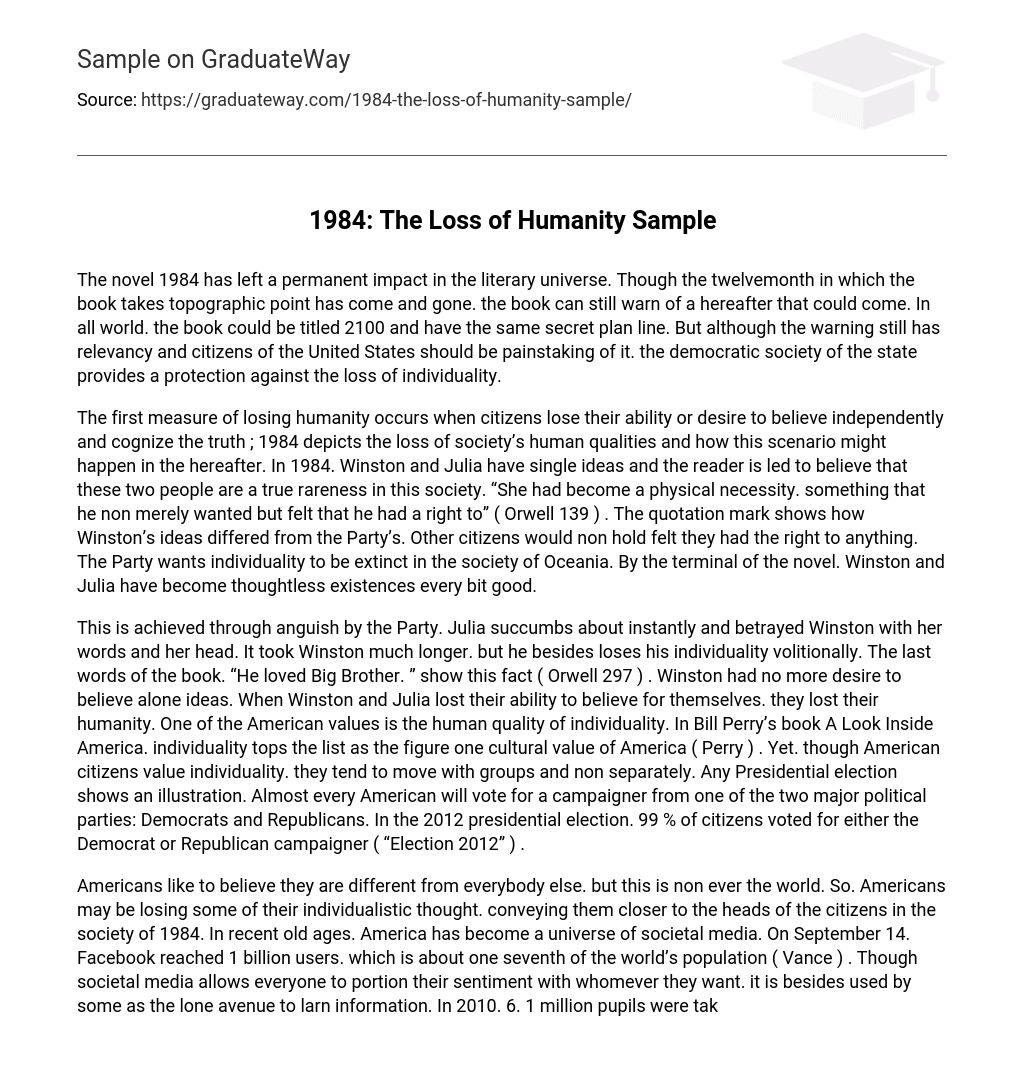The novel 1984 has left a permanent impact in the literary universe. Though the twelvemonth in which the book takes topographic point has come and gone. the book can still warn of a hereafter that could come. In all world. the book could be titled 2100 and have the same secret plan line. But although the warning still has relevancy and citizens of the United States should be painstaking of it. the democratic society of the state provides a protection against the loss of individuality.
The first measure of losing humanity occurs when citizens lose their ability or desire to believe independently and cognize the truth ; 1984 depicts the loss of society’s human qualities and how this scenario might happen in the hereafter. In 1984. Winston and Julia have single ideas and the reader is led to believe that these two people are a true rareness in this society. “She had become a physical necessity. something that he non merely wanted but felt that he had a right to” ( Orwell 139 ) . The quotation mark shows how Winston’s ideas differed from the Party’s. Other citizens would non hold felt they had the right to anything. The Party wants individuality to be extinct in the society of Oceania. By the terminal of the novel. Winston and Julia have become thoughtless existences every bit good.
This is achieved through anguish by the Party. Julia succumbs about instantly and betrayed Winston with her words and her head. It took Winston much longer. but he besides loses his individuality volitionally. The last words of the book. “He loved Big Brother. ” show this fact ( Orwell 297 ) . Winston had no more desire to believe alone ideas. When Winston and Julia lost their ability to believe for themselves. they lost their humanity. One of the American values is the human quality of individuality. In Bill Perry’s book A Look Inside America. individuality tops the list as the figure one cultural value of America ( Perry ) . Yet. though American citizens value individuality. they tend to move with groups and non separately. Any Presidential election shows an illustration. Almost every American will vote for a campaigner from one of the two major political parties: Democrats and Republicans. In the 2012 presidential election. 99 % of citizens voted for either the Democrat or Republican campaigner ( “Election 2012” ) .
Americans like to believe they are different from everybody else. but this is non ever the world. So. Americans may be losing some of their individualistic thought. conveying them closer to the heads of the citizens in the society of 1984. In recent old ages. America has become a universe of societal media. On September 14. Facebook reached 1 billion users. which is about one seventh of the world’s population ( Vance ) . Though societal media allows everyone to portion their sentiment with whomever they want. it is besides used by some as the lone avenue to larn information. In 2010. 6. 1 million pupils were taking at least one on-line class ( Lytle ) . Many citizens besides accept information off the cyberspace as true without proof.
Peoples become “followers” and can establish their sentiments on what person else says. In the society of 1984. the thought of societal media does non be. However. the act of blind following does be in 1984’s society. Large Brother is the citizens’ merely beginning of information and they do non oppugn the cogency of any claims made by the Party. By giving the people no other options than to believe them. the Party succeeds in taking away the human quality of individualistic thought. When a citizen such as Winston occurs. the Party does a really thorough occupation of converting the individual of their insanity. Orwell shows an oculus opening position into what society could go. Humanity could be lost and with it. individualistic thought. This warning will ne’er lose its relevancy and may really increase in relevancy with the turning laterality of societal media in democratic societies like the United States. 1984’s impact on the universe will non travel off ; it will merely derive importance.
Plants Cited
- Vance. Ashlee. “Facebook: The Making of 1 Billion Users. ” Bloomberg Businessweek. Bloomberg. 4 Oct. 2012. Web. 17 Nov. 2012.
- “Election 2012. ” CBSNews. CBS Interactive. 6 Nov. 2012. Web. 18 Nov. 2012.
- Orwell. George. 1984. 3-6. New York: Harcourt. 1949. Print.
- Perry. Bill. A Look Inside America. Ephrata: Multi Language Media. 2000. eBook.
- Lytle. Ryan. “College Professors Fearful of Online Education Growth. ” US Newss: Education. U. S News & A ; World Report. 06 2012. Web. 18 Nov 2012.





